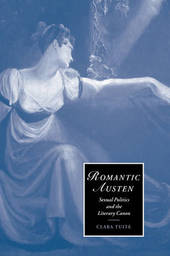
|
Romantic Austen: Sexual Politics and the Literary Canon
Paperback / softback
Main Details
Description
A full-length scholarly monograph examining Jane Austen's writings within the traditions of Romanticism. It argues that Austen's central position within the literary canon can only be fully understood by locating her work within Romantic cultural traditions. Taking the contemporary Austen revival as its cue, the study presents a series of historically contextualized readings of Austen's juvenilia (Catharine, or The Bower and The History of England), Sense and Sensibility, Mansfield Park and Austen's posthumously published novel, Sanditon, to examine ways in which Romantic-period definitions of nation, culture and literature continue to function in contemporary readings of Austen and her period. An investigation of the sexual politics of national culture, heritage culture and literary canon-formation informs the study's discussion of the relationship between Romanticism, Austen and the literary canon.
Author Biography
Clara Tuite is a Lecturer in English at the University of Melbourne. She is an associate editor of The Oxford Companion to the Romantic Age: British Culture 1776-1832 (1999). She has published articles on Gothic literature in Eighteenth-Century Life and Romanticism on the Net.
Reviews'The most exhilirating aspects ... lie in Tuite's conceptualization of Austen's oeuvre and in her brilliantly inventive, distinctive ways of opening up the texts to new readings, new echoes and new contexts.' European Romantic Review
|